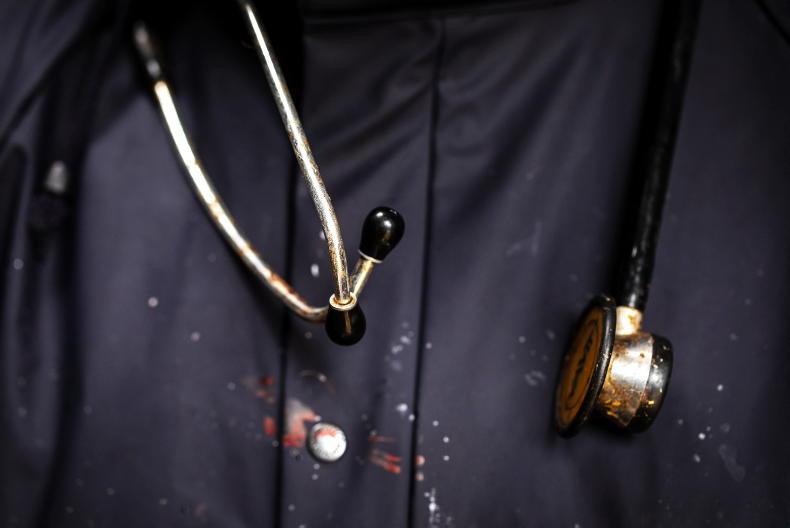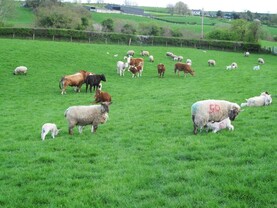A Cavan farmer and experienced agriculture inspector has avoided jail after dozens of dead and badly emaciated animals were found on his property.
In one of the worst animal welfare cases before a Cavan court in recent years, Gerard Brady (56) was fined more than €50,000 for permitting “unnecessary suffering” to his livestock by failing to provide sufficient food or water.
In sentencing, Judge John Aylmer considered that Brady, of Carriga, Crosskeys, appeared to have “lost motivation” in caring for his animals after experiencing a “reactive depression” caused by a series of close personal bereavements.
A meat factory inspector, employed by the Department of Agriculture for more than 20 years, Brady appeared before Cavan Circuit Court for sentencing on Friday 23 February.
The married dad of two had pleaded guilty to a sample of four out of nine contraventions of the Animal Health and Welfare Act in July 2023.
That included three counts of failing to provide sufficient wholesome and uncontaminated drinking water, food, or other nourishment, at Carriga on 10 February, 15 February and 17 February 2021; and a single count of “permitting unnecessary suffering to” or endangering the health and welfare of animals at Leeharry, Crosserlough, on 12 February 2021.
Along with dead animals, officials found others so weak they had to be euthanised.
Each of the offence dates relate to an inspection carried out.

Gardaí began investigating the matter in February 2021.
Gardaí took up their own investigation on 10 February 2021 after Department officials first got in contact to report the “discovery of dead animals”.
At Carriga, an officer found a “large number of dead sheep” with “almost no grass” to graze.
The remains of between 20 and 30 sheep were found at the site.
A week later, gardaí took a sworn statement from Alma Shanahan, an inspector at the Department of Agriculture.
Ms Shanahan said she visited the lands farmed by Brady on 10 February, finding one dead sheep by a perimeter fence and several more next to a drain.
Some of the sheep had died “recently” and others reduced to “skeleton”.
The feeders were “empty” and Ms Shanahan estimated around 100 lambs were still alive. Three sheep needed to be “euthanised”.
Brady was ordered to have the carcasses of the dead sheep removed and Ms Shanahan further served notice on the defendant to carry out a series of “corrective actions” that included supplementary feeding and a demand he reduce his stock down to 50.
Brady agreed, but with no alternative housing available, the inspector decided the “best course” was to serve a notice ordering the defendant to sell all of his sheep.
Ms Shanahan returned two days later on 12 February and walked the lands again, this time finding three lambs in a state of weakness.
To the rear and out of sight from the main road, Ms Shanahan found a parked trailer “piled” with sheep carcasses.
“It was not covered,” said Ms Shanahan, who found even more dead animals at a drain.
She spoke with Brady by phone, this time ordering the defendant to sell his sheep stock within a period of seven days. He agreed.

The counts included a failure to provide livestock with clean drinking water. / Philip Doyle
On 15 February, the Department carried out another welfare check, this time on equine stock owned by Brady.
There were seven horses, one in foal, and several others in “poor body condition”.
At another site, the same officials found 20 more horses of various ages being fed from silage dumped on the ground.
These animals were said to be in “average” body condition.
‘Severely emaciated’
On 17 February, Department inspectors called to Brady’s farm and discovered at the rear of a building a yearling pony “severely emaciated”. The pony had to be “euthanised on welfare grounds”.
They also found a dead Suffolk ram and skulls belonging to other animals.
In the shed, they found a cow so weak it was “unable to rise” and, at another location, dead lambs and sheep “stacked in a pyramid”-shaped pile.
When asked, Brady estimated he owned 21 horses at Leccary and three more at Carriga.
A pony that had to be euthanised, Brady said, had been treated for scour the October before and simply “didn’t thrive”.
He said the sheep would be “gone the following day”.

The accused was arrested and questioned. / Donal O'Leary
Ms Shanahan visited Brady on 15 March and gave a follow-up statement to gardaí then in May.
Gardaí spoke with Brady in June, who told them he first wished to speak with a solicitor.
Notwithstanding requests to meet, Brady “had to be arrested” in October 2021 and was questioned at Bailieborough Garda Station.
During interview, he acknowledged he was the “herd keeper”, but after that provided “no comment” answers, the court was told.
No previous convictions
Brady, who has no previous convictions, was represented in court by Tom Fitzpatrick BL, instructed by solicitor Brian Leahy.
Mr Fitzpatrick said a “regrettable aspect of the case” was that his client works for the Department, carrying out checks at a meat factory. However, Brady is currently suspended from the role, pending the outcome of proceedings.
While he attempted to section the offending into a “short window of time”, Judge Aylmer did point out that the “problem” with this claim hung on the state of decay of some of the carcasses found.
It was accepted by the court that the case carried traits of “negligence”, rather than animal abuse.
Year ending 2021, Mr Fitzpatrick noted Brady had cut his herd of cows to 71 and had “completely divested” himself from dairying.
Bereavements
The barrister went on to explain how his client had suffered several personal bereavements around 2016. He suffered a “reactive depression”, which led to him not living up to his “responsibility” as a farmer.
At the same time, Brady was also the subject of a “significant investigation” regarding work practices. Though “fully exonerated” in June 2020, Mr Fitzpatrick said this too had a “negative effect” on the defendant’s mental health.
Both medical and psychological reports were handed into the judge.

Livestock were euthenised on multiple dates after investigations had taken place. \ Philip Doyle
A probation and welfare report, Mr Fitzpatrick accepted, found that Brady “regards himself” as a victim.
But the barrister said this was “not the case” and his client “fully accepts his wrongdoing”.
Subsidies cut
As a result, the court heard that Brady has already paid a “heavy price” by being “on the radar” of agricultural inspectors and having his subsidies reduced from €30,000 to €6,000.
There were “real concerns” too with regards to his future employment as an inspector, a role he had held since 2001.
Judge Aylmer considered it “appropriate” to impose a fine rather than a custodial sentence in this case.
While “serious” and at the “upper end of the scale of offending”, the judge highlighted Brady’s “reactive depression” as a significant factor and a precursor to the “neglect”.
Noting the defendant’s gross wage of €50,000 from the Department, the judge sought to measure the fine against what Brady might actually be able to afford, reducing the maximum penalty of €250,000 to €20,000 on each of the four counts pleaded to before mitigation.
He acknowledged that Brady is currently suspended from his role as an inspector and could yet lose his job entirely as a “consequence” of his offending.
The offences, the judge said, appeared to be “of neglect rather than purpose”.
He therefore reduced the fine to €13,500 on each count admitted, totalling €53,200, with two years to pay.
The judge stopped short of banning Brady from having animals outright, stating that the punishment would have been “disproportionate and unnecessary” given the lack of prior convictions and circumstances in which the offending had occurred.
A nolle prosequi was entered on all remaining counts on the indictment.
A Cavan farmer and experienced agriculture inspector has avoided jail after dozens of dead and badly emaciated animals were found on his property.
In one of the worst animal welfare cases before a Cavan court in recent years, Gerard Brady (56) was fined more than €50,000 for permitting “unnecessary suffering” to his livestock by failing to provide sufficient food or water.
In sentencing, Judge John Aylmer considered that Brady, of Carriga, Crosskeys, appeared to have “lost motivation” in caring for his animals after experiencing a “reactive depression” caused by a series of close personal bereavements.
A meat factory inspector, employed by the Department of Agriculture for more than 20 years, Brady appeared before Cavan Circuit Court for sentencing on Friday 23 February.
The married dad of two had pleaded guilty to a sample of four out of nine contraventions of the Animal Health and Welfare Act in July 2023.
That included three counts of failing to provide sufficient wholesome and uncontaminated drinking water, food, or other nourishment, at Carriga on 10 February, 15 February and 17 February 2021; and a single count of “permitting unnecessary suffering to” or endangering the health and welfare of animals at Leeharry, Crosserlough, on 12 February 2021.
Along with dead animals, officials found others so weak they had to be euthanised.
Each of the offence dates relate to an inspection carried out.

Gardaí began investigating the matter in February 2021.
Gardaí took up their own investigation on 10 February 2021 after Department officials first got in contact to report the “discovery of dead animals”.
At Carriga, an officer found a “large number of dead sheep” with “almost no grass” to graze.
The remains of between 20 and 30 sheep were found at the site.
A week later, gardaí took a sworn statement from Alma Shanahan, an inspector at the Department of Agriculture.
Ms Shanahan said she visited the lands farmed by Brady on 10 February, finding one dead sheep by a perimeter fence and several more next to a drain.
Some of the sheep had died “recently” and others reduced to “skeleton”.
The feeders were “empty” and Ms Shanahan estimated around 100 lambs were still alive. Three sheep needed to be “euthanised”.
Brady was ordered to have the carcasses of the dead sheep removed and Ms Shanahan further served notice on the defendant to carry out a series of “corrective actions” that included supplementary feeding and a demand he reduce his stock down to 50.
Brady agreed, but with no alternative housing available, the inspector decided the “best course” was to serve a notice ordering the defendant to sell all of his sheep.
Ms Shanahan returned two days later on 12 February and walked the lands again, this time finding three lambs in a state of weakness.
To the rear and out of sight from the main road, Ms Shanahan found a parked trailer “piled” with sheep carcasses.
“It was not covered,” said Ms Shanahan, who found even more dead animals at a drain.
She spoke with Brady by phone, this time ordering the defendant to sell his sheep stock within a period of seven days. He agreed.

The counts included a failure to provide livestock with clean drinking water. / Philip Doyle
On 15 February, the Department carried out another welfare check, this time on equine stock owned by Brady.
There were seven horses, one in foal, and several others in “poor body condition”.
At another site, the same officials found 20 more horses of various ages being fed from silage dumped on the ground.
These animals were said to be in “average” body condition.
‘Severely emaciated’
On 17 February, Department inspectors called to Brady’s farm and discovered at the rear of a building a yearling pony “severely emaciated”. The pony had to be “euthanised on welfare grounds”.
They also found a dead Suffolk ram and skulls belonging to other animals.
In the shed, they found a cow so weak it was “unable to rise” and, at another location, dead lambs and sheep “stacked in a pyramid”-shaped pile.
When asked, Brady estimated he owned 21 horses at Leccary and three more at Carriga.
A pony that had to be euthanised, Brady said, had been treated for scour the October before and simply “didn’t thrive”.
He said the sheep would be “gone the following day”.

The accused was arrested and questioned. / Donal O'Leary
Ms Shanahan visited Brady on 15 March and gave a follow-up statement to gardaí then in May.
Gardaí spoke with Brady in June, who told them he first wished to speak with a solicitor.
Notwithstanding requests to meet, Brady “had to be arrested” in October 2021 and was questioned at Bailieborough Garda Station.
During interview, he acknowledged he was the “herd keeper”, but after that provided “no comment” answers, the court was told.
No previous convictions
Brady, who has no previous convictions, was represented in court by Tom Fitzpatrick BL, instructed by solicitor Brian Leahy.
Mr Fitzpatrick said a “regrettable aspect of the case” was that his client works for the Department, carrying out checks at a meat factory. However, Brady is currently suspended from the role, pending the outcome of proceedings.
While he attempted to section the offending into a “short window of time”, Judge Aylmer did point out that the “problem” with this claim hung on the state of decay of some of the carcasses found.
It was accepted by the court that the case carried traits of “negligence”, rather than animal abuse.
Year ending 2021, Mr Fitzpatrick noted Brady had cut his herd of cows to 71 and had “completely divested” himself from dairying.
Bereavements
The barrister went on to explain how his client had suffered several personal bereavements around 2016. He suffered a “reactive depression”, which led to him not living up to his “responsibility” as a farmer.
At the same time, Brady was also the subject of a “significant investigation” regarding work practices. Though “fully exonerated” in June 2020, Mr Fitzpatrick said this too had a “negative effect” on the defendant’s mental health.
Both medical and psychological reports were handed into the judge.

Livestock were euthenised on multiple dates after investigations had taken place. \ Philip Doyle
A probation and welfare report, Mr Fitzpatrick accepted, found that Brady “regards himself” as a victim.
But the barrister said this was “not the case” and his client “fully accepts his wrongdoing”.
Subsidies cut
As a result, the court heard that Brady has already paid a “heavy price” by being “on the radar” of agricultural inspectors and having his subsidies reduced from €30,000 to €6,000.
There were “real concerns” too with regards to his future employment as an inspector, a role he had held since 2001.
Judge Aylmer considered it “appropriate” to impose a fine rather than a custodial sentence in this case.
While “serious” and at the “upper end of the scale of offending”, the judge highlighted Brady’s “reactive depression” as a significant factor and a precursor to the “neglect”.
Noting the defendant’s gross wage of €50,000 from the Department, the judge sought to measure the fine against what Brady might actually be able to afford, reducing the maximum penalty of €250,000 to €20,000 on each of the four counts pleaded to before mitigation.
He acknowledged that Brady is currently suspended from his role as an inspector and could yet lose his job entirely as a “consequence” of his offending.
The offences, the judge said, appeared to be “of neglect rather than purpose”.
He therefore reduced the fine to €13,500 on each count admitted, totalling €53,200, with two years to pay.
The judge stopped short of banning Brady from having animals outright, stating that the punishment would have been “disproportionate and unnecessary” given the lack of prior convictions and circumstances in which the offending had occurred.
A nolle prosequi was entered on all remaining counts on the indictment.










 This is a subscriber-only article
This is a subscriber-only article









SHARING OPTIONS: